Various studies have shown that playing music, specifically classical or country, can and does affect horses in a positive way.
Playing music helps balance equine behavior in a number of ways; one of which because it helps to mask outside sounds and vibrations as well as providing a positive and relaxing effect.
The German pharmaceutical company, Boehringer Ingelheim, is one of the world’s leading research-driven pharmaceutical companies in the world. Boehringer Ingelheim Animal Health division, located in Duluth, GA, has done extensive studies on the effect of music and equine health and ultimately released a track of music specifically designed to help reduce stress in horses.
The ultimate goal was to reduce or eliminate the formation of stomach ulcers.
Another YouTube video worth watching is, “What’s Playing In the Barn?”
It appears that the European equine world has known about the positive effects of music on horses for quite some time. A 2015 study on purebred Arabian race horses looked at the emotional and performance levels of their horses when exposed to classical music.
The horses exhibited reduced stress levels by measuring cardiac activity levels and increased performance. A similar study was performed in Poland on race horses where the cortisol levels in their saliva was measured to assess stress levels. The classical signs of licking, chewing, yawning and drooping eyelids were also observed and recorded.
Music is the language of pitch, tone, frequency and volume – these are the elements of sound horses use to communicate.
Frequency and volume are the most important. In this case frequency does not refer to how often but to the number of vibrations counted per second.
Frequency in music includes the tempo, rhythm and tonality. The unit of frequency is the hertz, often represented as Hz.
In the 1800’s Heinrich Hertz was the first scientist to provide conclusive proof of the existence of electromagnetic waves. The most common use of the hertz is in the periodic waveforms found in musical tones. One hertz simply means one event per second.
Humans have the ability to hear up to 20,000 Hz while horses can hear up to 33,000 Hz!
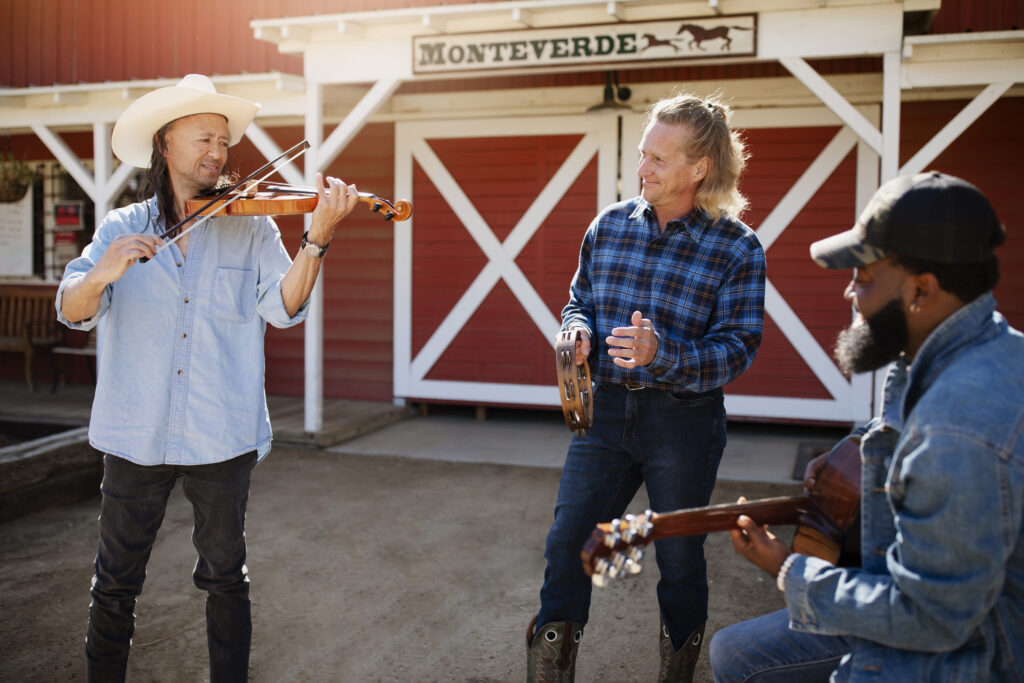
My own experimentation with classical music played at relatively low volumes has produced very positive results.
Often riders are disappointed to arrive at the barn to discover that there is no one to ride with. Sorry to say I’m exalted to discover that I have the indoor to myself.
Quite often others are critical of my choice in music which tends to be classical. However, these are the same people who frequently ask to ride my horse because of his calmness yet keenness. This is never allowed, by the way. He’s not a toy to be passed around.
Horses become very relaxed when in the company of someone they love and trust. The state of relaxation is enhanced by the choice of music employed. Horses associate music with comfort just as they do their owners’ voices.
When choosing music to ride with (not to) choose slower pieces. Look for the word ‘Adagio’. The instruments to look for include strings, including the harp, the flute, oboe and piano. No brass unless you’re performing some kind of spectacular freestyle.
The equine response to music is a physical evaluation. Therefore, you could play the same relaxing music over and over and they won’t become bored with it as a human would.
I actually believe that my horse becomes disappointed if I swap out one of his favorite CD’s for something new. He equates “Eleven Words” by David Foster with a quiet ride. That doesn’t mean we don’t still work on our dressage moves. It just means that the energy level has been brought down.
The following are some suggestions:
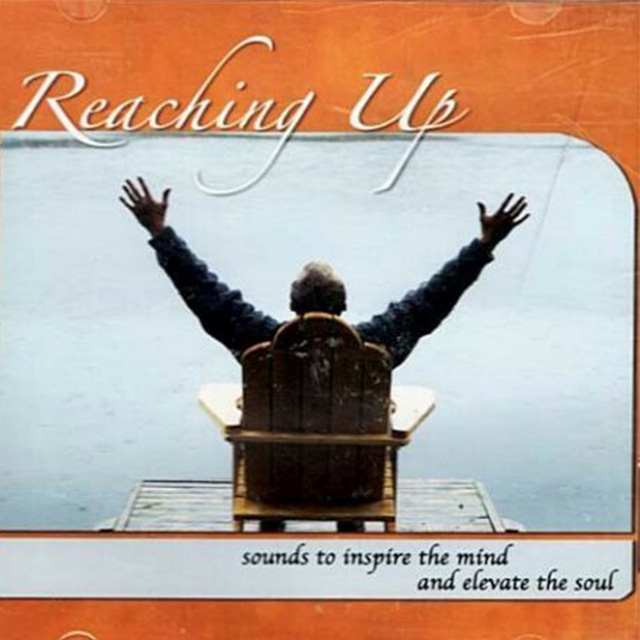
‘Reaching Up’ by Various Artists
The jacket on this CD features a man sitting on an Adirondack chair with his arms raised. I mention this since when I looked on Amazon there are many CD’s with the same name.
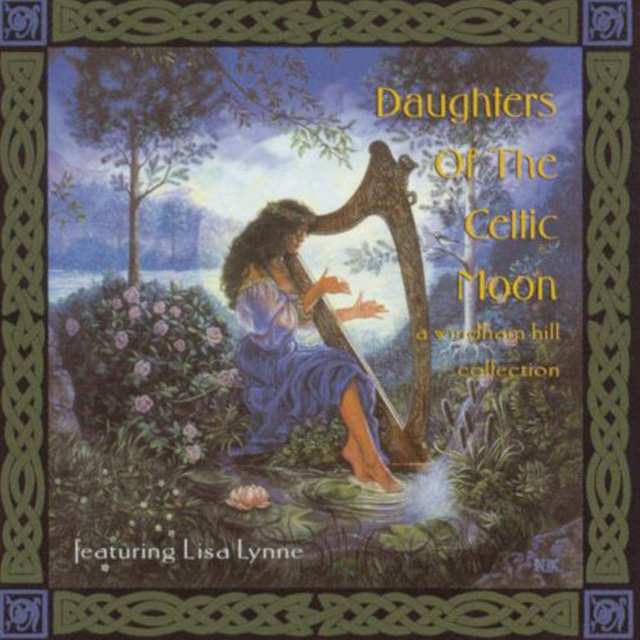
Daughters of the Celtic Moon
This is also relaxing with some tracks appropriate for trotting/gaiting and cantering. It includes Sting’s ‘Fields of Gold’ but performed on the harp. This is a very interesting arrangement.
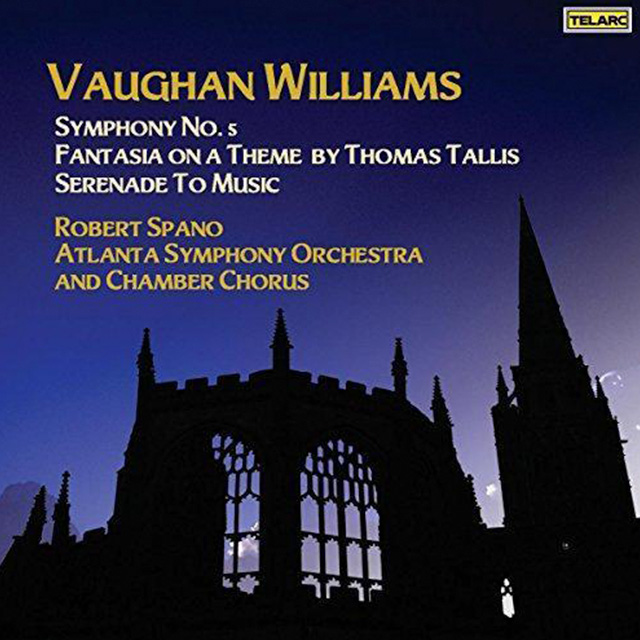
Fantasia on a Theme by Tallis
Vaughn Williams ‘Fantasia on a Theme by Tallis’ is very meditative. Tallis was an English composer from the early 1500’s. This CD also includes Samuel Barber’s ‘Adagio for Strings’. ‘Secret Garden’ composed by Rolf Lovland.
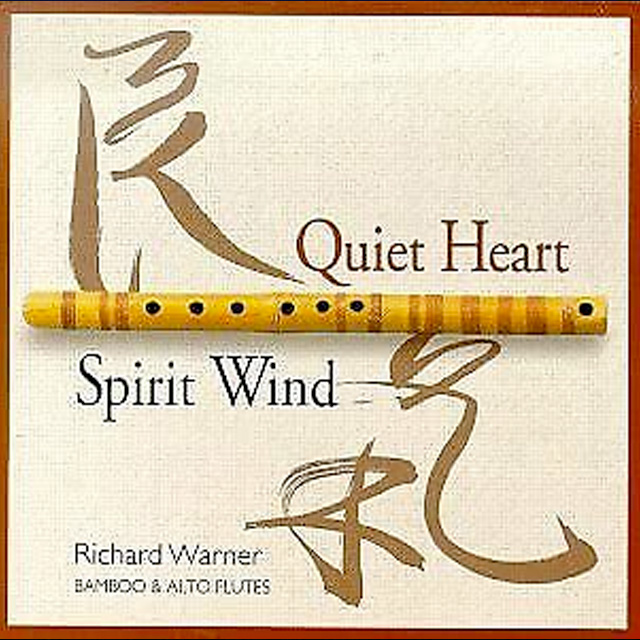
Quiet Heart, Spirit Wind
This is more appropriate for the massage that comes after the ride.
Finally, my favorite:
‘Eleven Words’ by David Foster
This was written during the pandemic – his way of dealing with the isolation and helplessness felt during that period of our lives.
Listen to them online or at the library. You can make your own playlist or simply buy the CD.
Don’t go crazy – choose one of the above or something similar and stick with it for several months. And keep in mind – jazz and rock don’t work if what you are trying to achieve is a calm, relaxed yet attentive horse.
Enjoy and comment below… what is your favorite music to ride to?

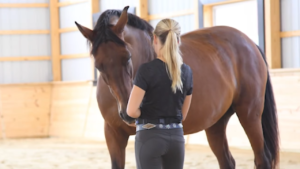
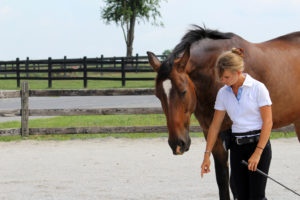
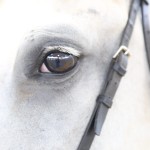










13 Responses
My horses definitely respond well to music and each has their favourite. My boy absolutely loves the Dance of the Sugar Plum Fairy from The Nutcracker ballet by Tchaikovsky. His lips and eyelids droop and his breathing gets really deep and slow. It has helped him get better at having his legs brushed, which he used to hate. Even if I just hum it, it’s good enough for him.
Both horses really like listening to solfeggio sounds too. They become instantly very calm listening to them, particularly the 528Hz frequency.
I think all animals respond well to music. I had a glorious pig who loved being sung to too. She would sigh and lick her lips and go to sleep. Her favourite was Truly Scrumptious from Chitty Chitty Bang Bang. So sweet.
I remember a study some years back that correlated leaving a radio on with in INCREASE in the incidence of gastric ulcers. Talk radio was worse than music. Personally, I keep my barn music free. I want my horses to be able to hear what is going on in their environment. It might save their lives someday.
YES!!! – Great to read this article. My horse’s behaviour appears to be affected by music. When we work together (arena and at liberty)- he seems to like rhythmic (percussive) music and appears to prefer marching band music like Colonel Bogey. Over the years he has become disinterested in arena work – except when I play music with a well defined rhythm – his eyes brighten and he is all in. That said, I don’t know (with certainty) that it is the music alone that causes his behaviour/energy changes. Perhaps it is also my energy (with music) that influences our dance? – Don’t know – but music sure has a positive effect on our arena activities.
My horse unaccountably prefers Disney tunes under saddle….the cheerful rhythm seems to help us keep a steady cadence. We once tried opera music, highly recommended, but based on the startled response, spin around and statement poop, that was a clear and definite Nope.
I once tried singing Puccini arias while feeding. The horse did not like it
Thank you! I’m a believer that music affects animals and love the music you have shared with us and suggested. It’s right in my channel! I even notice a difference when I sing to my horse.


I am going to explore these music options! I appreciate the information. Because horses gaits are rhythmic, it makes sense to me that horses would enjoy certain kinds of music.
Also. One of my horses is lame in front at the trot and undiagnosed as of now. Tried 13 sessions of chiro and it did not help. I’ve started walking her with music to try to help her. Now, I have more information!!!! I’ve also done quite a bit of research on line and plan to connect with an equine massage therapist. Tried a local therapist and the horse feels so relaxed after, but it’s not a lasting improvement.
I adopted a rescue that cribs and I’m going to try playing the music you recommend for ulcers!
Thank you!
Thanks for the information!
My mare loves when I sing for her. She seems much more relaxed. I sing every Irish songs I know and they all work good but she has her favorite: Sally’s garden! Very useful to calm a horse on trail.
I am thrilled to read this! As a singer songwriter I have always shared music vocally with my horses & they have always responded in such a positive way. I joke sometimes that I’m “boring” them because many times they begin yawning & hanging their heads lower. I use to sing to my neighbors unbroken, never handled donkey (a Jack) who would put his head over the fence, against my chest & just sleep. As a child I use to soothe my brothers race horses too. It’s seems to be the energy that it creates.
I’ve been watching the Prime Video series, Daisy Jones and The Six, and love the soundtrack. It’s very Fleetwood Mac sounding and storyline. At my barn, the owners play Country music 24/7 and when they are not around I’ve been playing the soundtrack for Daisy Jones, named Aurora, for my horse. She seems to love it while she has her “spa time”, aka, grooming time. I sing the tracks to her from Aurora and she seems to love it! Mainly, due to my happy vibes I have from Aurora. The Country-Western music due to me not liking it causes me to be tense, which she feels. We also listen to Classical or Sarah McLaughlin again noticeable differences based on me liking the music which she feels from me.
I loved the video “What’s Playing in the Barn” and just shared it with my neighbor who works for a different division of BI and didn’t know about this research. “Relax Trax” will be a nice alternative to never-ending Enya that an anxious Connemara I work with has found soothing—ambient background sound to muffle scary arena sounds without sudden changes in tempo and pitch. Thanks for this!
I often sing or whistle when my horse and I ride out. It seems to make him more relaxed but we can still notice nature around us and wild animals. Indoors I like for example a waltz by Strauss. Perhaps the reason is that it makes me more relaxed and yet concentrated.
my mare loves Celtic/Medieval fantasy/tavern music. it’s really nice music. I recently played it for her during her chiro adjustment. often play it when I’m just in the barn, & grooming. she is so calm.